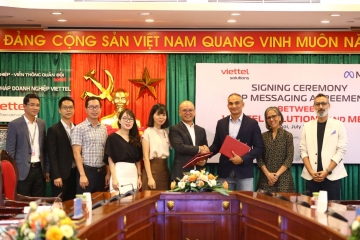Vietnam state-owned Viettel bets on global reach via M&A or telecom licence route
Tell us about the recent milestones that Viettel achieved.
Viettel has become one of the leading business groups in Vietnam, and our top position is not limited to the telecom sector. Founded in 1989 and being the first to be licensed to provide all kinds of telecom services in Vietnam, Viettel has seen exponential growth since 2000, when its revenue was only $2 million.
When we entered the mobile market in 2004, the penetration stood at only 5 per cent. But due to Viettel as a major part of this industry, the penetration rate is currently estimated at around 130 per cent.
We started to invest globally in 2006 and are present in nine countries, comprising a population of 180 million. The most important role we are playing in these countries is to contribute to the development of the telecom industry, particularly in Africa.
In addition, one of our new strategic areas is R&D. Besides providing services, we aim to develop new telecom devices. Hopefully, we can provide such products to the market in the near future and Vietnam will no longer be reliant on imports.

Mr. Le Dang Dung - Vice General Director of Viettel Group
What is your strategy on investing in global markets? Do you look at only emerging markets or target developed ones?
Our goal is to make investments in any market that has potential. But we choose emerging countries as our first destination because, in developed nations, the market has saturated, and sharing of telecom infrastructure is limited. Meanwhile, the penetration rate in emerging countries is low, at around 30-40 per cent in some African nations. Also, resources in terms of frequencies and licenses are abundant there. These markets operate quite similarly to Vietnam (also an emerging country), so they are appropriate for our operations.
We treat telecom as a basic need and therefore Viettel’s investment strategy aligns closely with the needs of emerging markets.
We are constantly accessing and looking for investment opportunities in markets worldwide that align with our vision of universalizing telecom and bridging the development gaps, including developed countries. The forays into these markets require a different approach and a different search for opportunities. If a new technology is invented, it can be the launchpad for us to enter; or we will acquire a local business to enter.
How about the risks and competition in emerging markets?
Doing business in emerging countries is always attached with risks, such as political risks, which can create disadvantages for any investor; low income and spending, cultural barriers, natural disasters and, of course, competition. Other telecom companies in the world are also realising the opportunities in these countries and setting up their footprint. So we are competing with international giants who have strong financial capacity and have a lot of experience investing globally.
Competition is really harsh. Viettel has the local advantage of operating in the Asian market, while several international players have failed. In other regions, Viettel is gearing towards the number one position, like in Burundi and Mozambique. Viettel has become the leading player in Laos, Cambodia and Timor Leste.
But we have to compete with a strong Africa-focus competitor, MTN Group. For our newly invested markets in Cameroon and Tanzania, we are at the third and fourth place, respectively.
Viettel aims to be one of the 10 most active groups in making investments abroad in the ICT industry till 2020. What are the targets you have set?
We aim to invest in 20 countries, or a total market of 600 million people. There are different methods for us to foray into the targeted countries, either by applying for new licenses or through acquisitions. As the possibility of having licenses is narrowing, more acquisitions are expected to happen. Recently we have received license for operation of a joint venture in Myanmar.
Tell us about the potential of the overseas markets that Viettel is present in. And how about Vietnam?
The development of telecom is inevitable in any country’s growth path. That is where opportunities are generated. It was the same for Vietnam in the 90s. As the economy grows, investment in telecom follows. So by making an early presence in these emerging countries, there will be a lot of opportunities for Viettel.
In developed markets, we see more opportunities to apply ICT into every aspect of life including health, education, e-government, power and traffic management. In Vietnam, there is a huge opportunity to universalise internet to serve demands for competitively-priced mobile broadband internet.
Mobifone is soon to be privatised, while FPT is also strong in internet and tech. What is your take on competition in terms of mobile and internet within the private sector?
We see competition as an advantage and driver for our own growth, so we expect to see more players in this industry. We have to get ready as Vietnam has opened the economy by signing free trade deals like the TPP, which means there will be foreign competitors.
dealstreetasia.com




